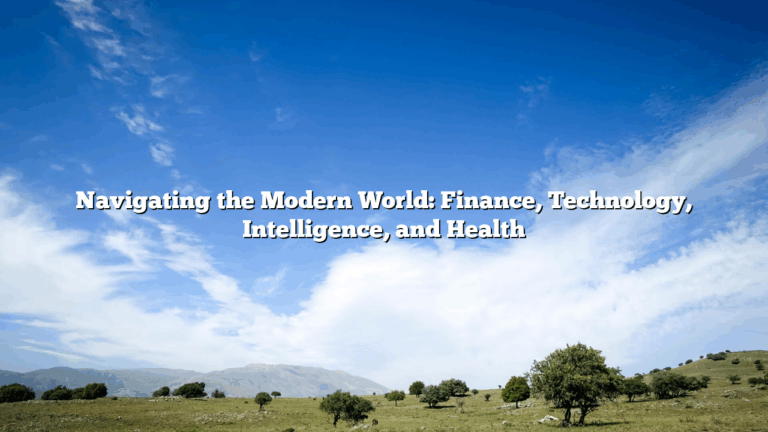
Exploring the Relationship Between Finance and Health
Introduction:
In today’s fast-paced world, money management plays a crucial role in shaping technology advancements, intelligence, and even the state of healthcare. The integration of economic strategies into these domains is becoming increasingly important. This article explores how these sectors interconnect and influence one another, fostering growth, development, and improvement in healthcare.
Financial Influence on Technology and Innovation
Money management is a critical driver of innovation. The availability to capital allows businesses and entrepreneurs to develop cutting-edge technologies, from artificial intelligence to sustainable. Startups and established companies alike rely on venture capital to scale their operations and create solutions that improve our daily lives.
Without adequate investment, many promising technologies would remain theoretical. For example, the rise of blockchain technologies has been fueled by billions of dollars in investment, enabling decentralized finance systems that challenge traditional banking. Financial backing supports research and development, allowing ideas to be turned into real-world applications that solve complex problems.
Moreover, investment trends influence technology’s pace and direction. Venture capital trends often dictate which tech innovations receive the attention and resources necessary to thrive. The market’s behavior affects which products reach consumers, setting the tone for the future in development.
The Intersection of AI and Finance
Artificial intelligence (AI) is revolutionizing both the financial and medical industries. In banking, AI-powered algorithms are used to analyze vast amounts of data, identifying trends and predicting market movements. This level of sophistication allows for more accurate forecasting and decision-making.
Financial institutions use AI in algorithmic trading, fraud detection, and customer service, enabling them to operate more efficiently. AI-driven automation reduces human error and enhances the speed of financial transactions, leading to improved profitability. Additionally, AI is utilized in investment management, helping investors make more informed decisions by analyzing historical data and anticipating future market fluctuations.
In the medical sector, AI is making significant strides in diagnosing diseases, personalizing treatment plans, and even predicting patient outcomes. AI-driven systems can analyze medical images, genetic information, and patient records to deliver faster and more accurate diagnoses, reducing human error. Furthermore, AI technologies are supporting drug discovery and the development of new therapies, opening new possibilities in healthcare.
Technology’s Role in Improving Healthcare
Technology has had a transformative impact on the medical sector, improving outcomes and making care more accessible. The use of telemedicine, for example, has expanded access to care, especially for individuals in remote or underserved areas. Telehealth allow patients to consult with doctors and specialists without the need for in-person visits, reducing costs and time barriers.
Wearable technology, such as smartwatches and fitness trackers, is empowering individuals to take control of their health. These devices monitor vital signs, track physical activity, and provide real-time data to both users and healthcare providers. This constant flow of information can lead to better prevention strategies and earlier intervention for health issues.
Moreover, data analytics in healthcare allows for more personalized care. By analyzing large sets of patient data, healthcare providers can tailor treatments to individual needs, improving both the effectiveness and efficiency of healthcare delivery.
Financial Planning for Health and Wellness
Managing finances is not limited to businesses; it extends to personal health and wellness as well. Health insurance plans, retirement funds, and wellness investments all require thoughtful financial planning. Individuals need to consider not only their immediate healthcare expenses but also long-term wellness goals, such as saving for future medical costs or investing in health-promoting activities.
In a world where healthcare costs are rising, financial planning can make a significant difference in securing access to the necessary care. From preventive measures to treatment options, having the right financial resources can ensure that individuals and families are prepared for health-related expenses, ultimately promoting overall well-being.
Jaringbet between finance and healthcare is essential in a world where individuals are increasingly responsible for managing their own health. Understanding how to effectively manage finances can lead to better healthcare outcomes and improved quality of life.
Conclusion:
In conclusion, the relationship between economic systems, technology, intelligence, and health systems is growing ever more complex and interconnected. Capital flow fuel technological advancements, which, in turn, improve the state of both healthcare and artificial intelligence. By understanding these connections, we can create a more efficient, sustainable, and healthier future for individuals and communities worldwide.


